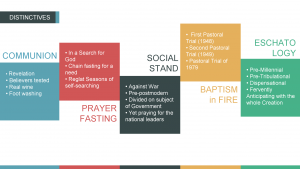Pacifism as a Social Stand for Holiness among Early Bulgarian Pentecostals
 Historical and Doctrinal Formation of Holiness Teachings and Praxis among Bulgarian Pentecostals (Research presentation prepared for the Society of Pentecostal Studies, Seattle, 2013 – Lakeland, 2015, thesis in partial fulfillment of the degree of D. Phil., Trinity College)
Historical and Doctrinal Formation of Holiness Teachings and Praxis among Bulgarian Pentecostals (Research presentation prepared for the Society of Pentecostal Studies, Seattle, 2013 – Lakeland, 2015, thesis in partial fulfillment of the degree of D. Phil., Trinity College)
When Pentecostalism began to spread rapidly in Bulgaria in the 1920s, it was viewed hostile as by both Protestant and Orthodox traditions. Not fasting during lent and not sacrificing for the dead, not honoring Mary or the saints was all detrimental in the formation of the identity of Pentecostal churches in Bulgaria. Even insignificant things like not wearing a cross, or not making the sign of the cross and not lighting candles and incense were noticed and severely criticized by the surrounding culture. And of course not drinking alcohol in Bulgaria and the Pentecostal abstinence was met with enormous opposition from other religious groups. Along with that any benevolence, social involvement, spiritual upbringing of minors (including sport actives) was all condemned as harmful protestant propaganda.
But one specific evangelical stand could never be forgiven – the protestant pacifism in the form of conscientious objection against carrying arms. For the newly re-born Balkan state, in a place where war has been ongoing for centuries, to refusal to go to war was essentially to refuse to be a Bulgarian.
The pacifism of Bulgaria’s evangelicals was silent but powerful against both Hitler’s fascism and the militant atheism of the coming Communist Regime. Their deep Christian conviction simply did not allow them to kill, carry a weapon, imprison another human being, swear allegiance to the communist state or take orders from another authority but God. And for their stand, many ministers and believers paid a heavy price. About 40 ministers and members of the Bulgarian Church of God alone were sentenced to hard prison labor for noncompliance with the mandatory military service. Hundreds more known and unknown believers from other evangelical churches followed.







